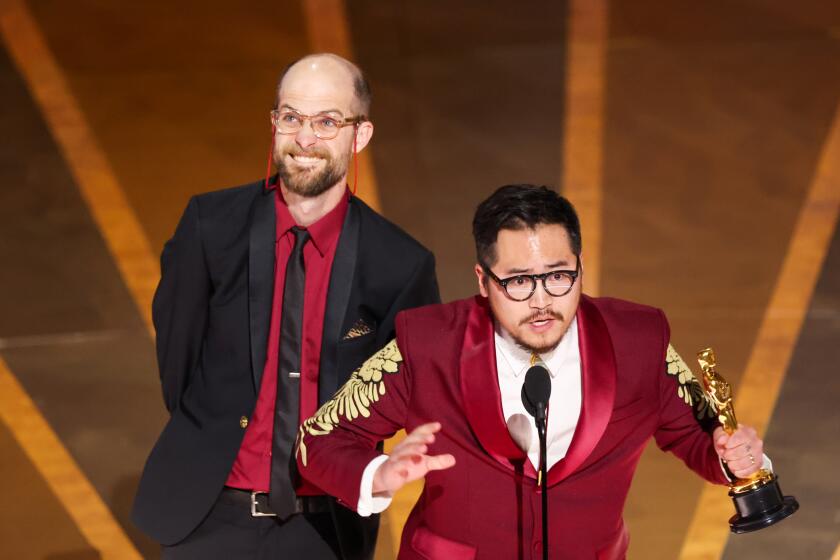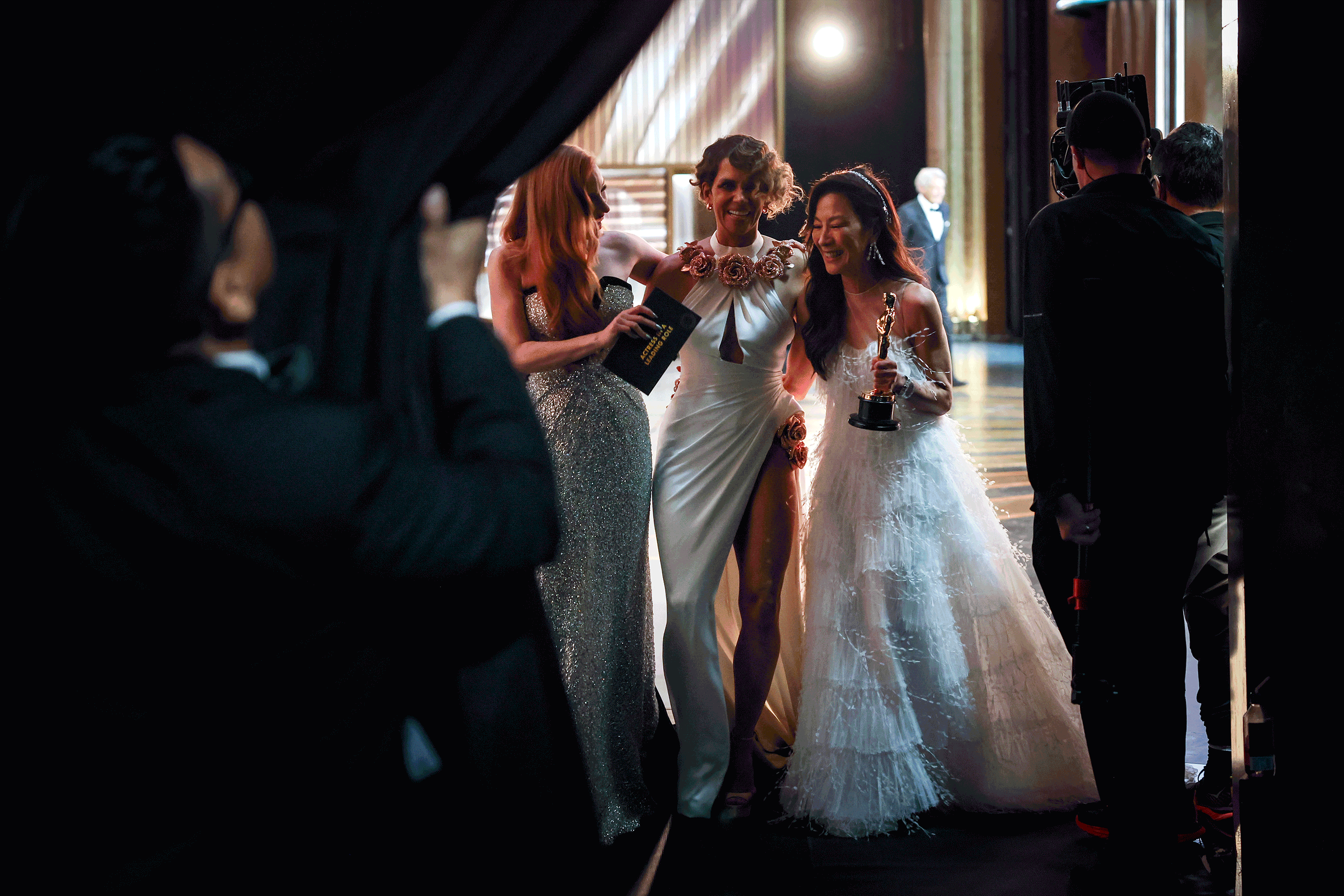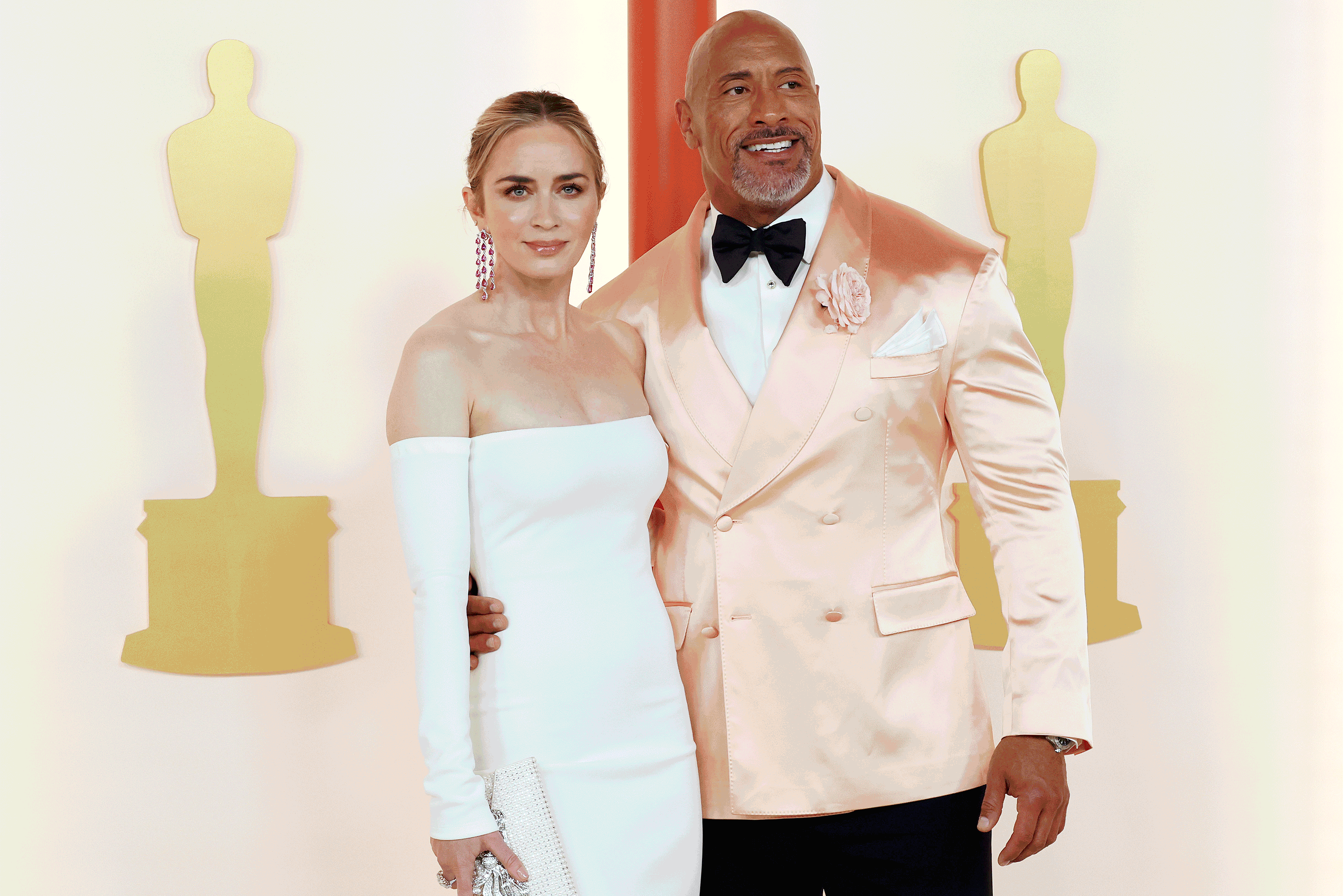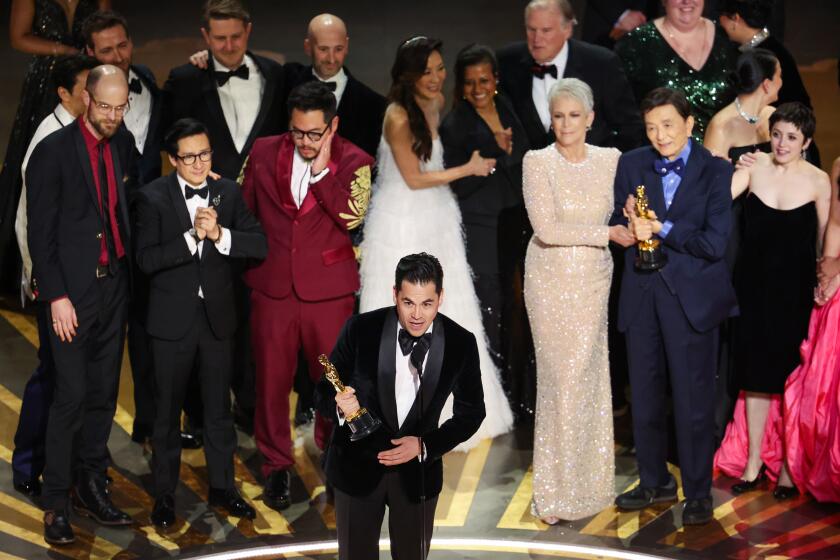‘Everything Everywhere All at Once’ takes best picture Oscar and six others
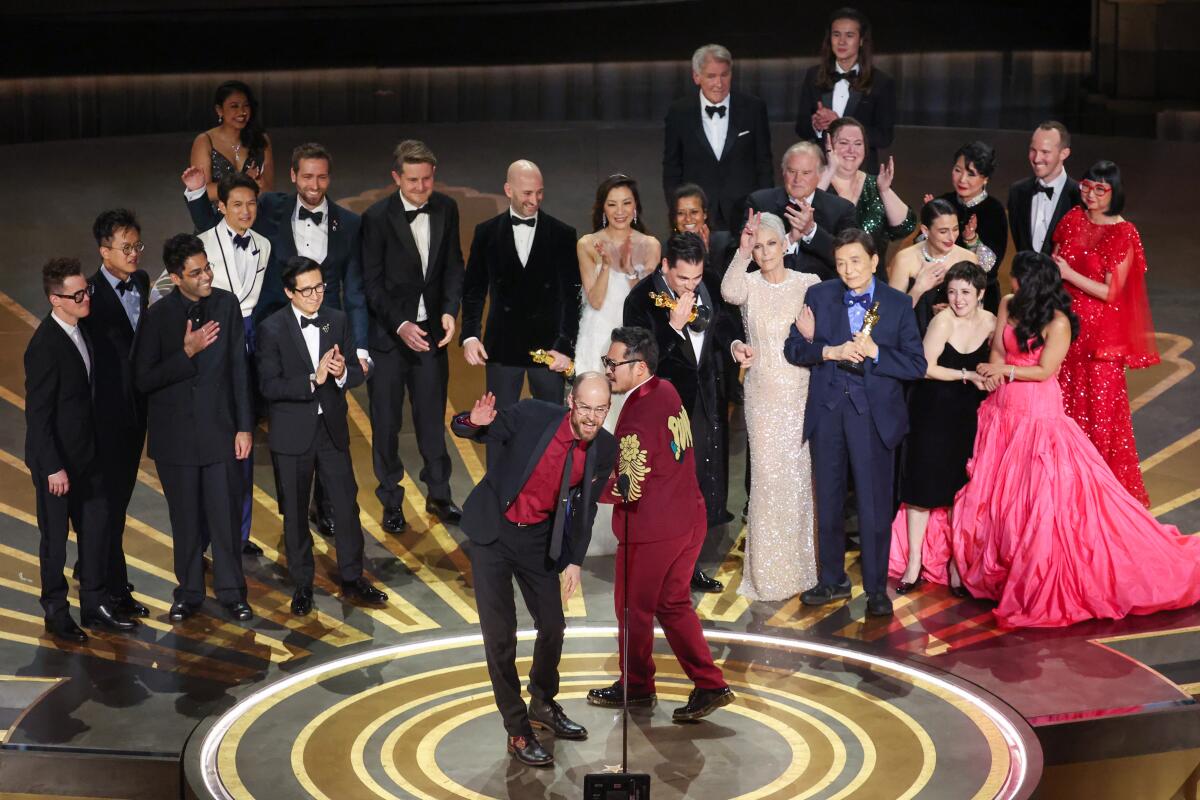
- Share via
It didn’t win quite everything everywhere all at once. But it came pretty darn close.
“Everything Everywhere All at Once,” a gleefully bonkers sci-fi-action-comedy mash-up about a Chinese American immigrant who traverses the multiverse to keep her family together, claimed best picture at the 95th Academy Awards on Sunday night, beating out a diverse field that included massive blockbusters as well as intimate art-house fare.
Leading the field with 11 nominations, “Everything Everywhere” won seven, including lead actress for Michelle Yeoh, supporting actor for Ke Huy Quan and supporting actress for Jamie Lee Curtis, along with original screenplay and directing wins for co-directors Daniel Kwan and Daniel Scheinert.
The 2023 Oscar winners include “Everything Everywhere All at Once,” Brendan Fraser, Michelle Yeoh and “All Quiet on the Western Front.”
The outside-the-box indie — which features dizzying martial-arts fights, fingers made of hot dogs and sex toys used as weapons — initially seemed an unlikely candidate for Oscar glory when it was released nearly a year ago. But “Everything Everywhere” proved a sleeper hit, grossing more than $100 million worldwide and, powered by its combination of gonzo filmmaking and poignant themes of familial love and generational trauma, gradually established itself as a genuine contender.
As awards season heated up, the film picked up momentum, steamrolling through the major Hollywood guilds to emerge as an Oscar front-runner.
Accepting the directing trophy alongside Kwan, Scheinert thanked his parents “for not squashing my creativity when I was making really disturbing horror films, or really perverted comedy films or dressing in drag as a kid — which is a threat to nobody.”
Yeoh took home the lead actress award for her turn as the no-nonsense matriarch of “Everything Everywhere,” making the Malaysian-born action icon the first Asian to win that prize. “For all the little girls and boys who look like me watching tonight, this is a beacon of hope and possibilities,” Yeoh said. “And ladies, don’t let anybody tell you you are past your prime.”
Capping one of the year’s most inspiring comeback stories, Quan — who broke out as a 1980s child star in “Indiana Jones and the Temple of Doom” and “The Goonies” only to step away from acting due to a lack of opportunities — was honored for his turn as the film’s meek husband.
“My journey started on a boat,” Quan said in one of the evening’s most emotional speeches. “I spent a year in a refugee camp. And somehow I ended up on Hollywood’s biggest stage. They say stories like this only happen in the movies.”
An exclusive look at what happened backstage at the 2023 Oscars.
Former matinee idol Brendan Fraser, with the lead actor win for his wrenching turn as a morbidly obese man in “The Whale,” reached the climax of a his own comeback story.
Lending a potential boost to the Oscars telecast, which has seen its viewership drop by nearly two-thirds over the last decade, this year’s best picture race included a handful of bona fide blockbusters, including “Top Gun: Maverick,” “Avatar: The Way of Water” and “Elvis.” In a tribute to “Top Gun,” which grossed $1.5 billion worldwide last summer, the show kicked off with a U.S. Navy flyover.
In the end, though, “Top Gun” and “Avatar,” like many commercial tentpole films before them, saw their victories limited to technical categories, with “Avatar” taking the visual effects prize and “Top Gun” winning for sound. Despite their roles in helping pull Hollywood out of its pandemic slump, “Top Gun” star Tom Cruise and “Avatar” director James Cameron were no-shows at the ceremony — absences that host Jimmy Kimmel sharply called out in his opening monologue: “The two guys who insisted we go to the theater didn’t come to the theater.”
Some of the year’s other major contenders also fell short of early expectations. Steven Spielberg’s autobiographical “The Fabelmans” came away from the night empty-handed, as did the critically acclaimed drama “Tár” and the crowd-pleasing “Elvis.”
For the academy, the show marked an effort to restore the Oscars’ luster following last year’s calamitous telecast, which was shockingly derailed when Will Smith struck Chris Rock onstage over a joke about Smith’s wife, Jada Pinkett Smith. In the run-up to Sunday’s show, speculation swirled as much around how the telecast would handle the subject of “The Slap” as the races themselves.
The best looks from the 2023 Oscars: from Lady Gaga to Mindy Kaling.
In a monologue that otherwise steered mostly clear of controversy, feeling like a throwback to the Billy Crystal style of gentle Oscar ribbing, Kimmel tweaked the academy for its handling of the incident and its aftermath.
“We have strict policies in place,” Kimmel said. “If anyone in this theater commits an act of violence at any point during the show, you will be awarded the Oscar for best actor and permitted to give a 19-minute-long speech.” (In the wake of the incident, Smith resigned from the academy and was barred from any academy events for 10 years.)
While many have argued that the nearly century-old awards ceremony needs an overhaul for the age of TikTok, Sunday’s Oscars stuck largely to its familiar template, offering the film industry a comforting respite from its existential anxieties over the future of the business. In one of the few evident deviations from tradition, the red carpet was not red but champagne-colored. (In an unrolling ceremony days before the show, Kimmel joked that the decision to switch the color “shows how confident we are that no blood will be shed.”)
For the first time since 2018, there was a single host — with Kimmel marking his third time as emcee — and the telecast’s producers leaned into buzzy musical performances, including from pop stars Rihanna, hot off her Super Bowl halftime show, and Lady Gaga, who delivered a starkly emotional rendition of her original song nominee, “Hold My Hand” from “Top Gun.”
Last year, in an effort to trim the show’s notoriously bloated running time, the academy shifted eight below-the-line and short-film categories out of the live telecast, with clips from the winners’ speeches edited into the show. Following a bitter backlash from the group’s members, academy leaders reversed the decision, which failed to produce a shorter show, and this year all 23 awards were handed out live.
For the audience gathered in the Dolby Theatre, the renewed attention to filmmaking’s below-the-line crafts was clearly welcome, even as it added to the show’s length. As the show headed into its third hour, with many categories still to go, Kimmel cracked that the hour just lost to daylight savings had been added back into the telecast.
At a time when movie theaters are struggling to return to their pre-pandemic health, this year’s Oscars offered a morale boost for exhibitors. After last year’s watershed best picture win for Apple’s “CODA,” the first for a streaming service, streamers had a weak showing this year, nabbing just one of 10 best picture spots with Netflix’s World War I drama “All Quiet on the Western Front.”
For all its representational achievements, the sentimental, self-important ‘Everything Everywhere All At Once’ is not as bold a choice as it appears.
That film won four Oscars, including cinematography, international feature, production design and score — a strong showing that spoke, in part, to the increasingly global makeup of the academy, which has expanded to more than 10,000 members in recent years. As the film’s composer Volker Bertelmann gave his acceptance speech, one attendee at the bar was heard noting, “This is not an American academy anymore.”
As in recent years, the show highlighted the diversity of its nominees, and Kimmel gave a special shout-out to two Black actresses, “Woman King” star Viola Davis and Danielle Deadwyler of “Till,” who many felt had been snubbed. While none of this year’s winners in the acting categories was Black, the wins for “Everything Everywhere” marked a high point for Asian representation at the Oscars. And with her Oscar for “Black Panther: Wakanda Forever,” costume designer Ruth E. Carter became the first Black woman to win two Oscars.
Though no women were nominated in the directing category this year, “Women Talking” director Sarah Polley took home the adapted screenplay prize for the drama about a group of women in a cloistered religious community who band together against their sexual abusers. “I want to thank the academy for not being mortally offended by the words ‘women’ and ‘talking’ so close together like that,” Polley said, accepting the award.
Despite all the difficulties the industry and the Oscars themselves have faced in the last few years — or perhaps because of them — the audience of Hollywood luminaries in the Dolby seemed ready to forget its troubles and self-soothe for a night.
In that spirit, at one point midway through the show, Kimmel brought out what he said was Jenny, the donkey from the film “The Banshees of Inisherin.”
“Not only is Jenny an actor, but she’s a certified emotional support donkey,” he told the crowd. “Feel free to come up and give her a hug.”
In reality, according to “Banshees” supporting actress nominee Kerry Condon, the donkey was not the one that appeared the film. “All the way from Ireland?” Condon told The Times. “Of course not!”
But hey, that’s Hollywood.
Times staff writers Amy Kaufman and Jen Yamato contributed to this report.
More to Read
Sign up for The Envelope
Get exclusive awards season news, in-depth interviews and columnist Glenn Whipp’s must-read analysis straight to your inbox.
You may occasionally receive promotional content from the Los Angeles Times.

